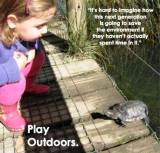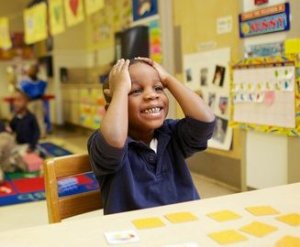May 4, 2014
 Intelligence is a much more interesting, democratic, and dynamic process than a lot of people realize.
Intelligence is a much more interesting, democratic, and dynamic process than a lot of people realize.
There’s a dangerous but all too prevalent misconception that some people are born intellectually gifted (and the rest of us aren’t). From this perspective, traditional models of gifted education make good sense. All one has to do is figure out who has the extra dollop of intelligence, call them ‘gifted,’ and segregate them with each other in order to give them special educational experiences. Under this misconception about the nature of intelligence, the best way to ascertain whether a person belongs to the gifted category (or not) is to administer an intelligence test. The resulting score—an intelligence quotient or IQ—is then interpreted as being stable over the person’s lifetime.
The more that’s being learned about the brain, however, the more that cognitive scientists and neuropsychologists are emphasizing the dynamic nature of intelligence and the diversity of developmental pathways that lead to gifted levels of competence and achievement. Ability is spread much more broadly across the population than the demographic distribution of IQ scores would suggest, and is much more amenable to environmental influences like family life and day-to-day experiences. Continue reading →
Posted in academic success, brain development, categorizing kids, developmental diversity, education, educational challenge, engagement, gifted label, gifted programming, giftedness, gifts, inclusive gifted education, intellectual challenge, intelligence, IQ, neuroscience, segregated gifted programming |
Leave a Comment »
April 24, 2014
 Spending more time outdoors, preferably in natural settings, may be the simplest, healthiest, and most economical remedy for the terrible increase in numbers of children diagnosed with social, emotional, and learning problems over the past two decades. It may also be the answer to many problems suffered by adults in our increasingly rushed, technology-focused lives. And on a global scale, there’s evidence that more people spending more time in natural spaces would contribute to solving the environmental challenges that are increasingly disrupting our lives. Continue reading →
Spending more time outdoors, preferably in natural settings, may be the simplest, healthiest, and most economical remedy for the terrible increase in numbers of children diagnosed with social, emotional, and learning problems over the past two decades. It may also be the answer to many problems suffered by adults in our increasingly rushed, technology-focused lives. And on a global scale, there’s evidence that more people spending more time in natural spaces would contribute to solving the environmental challenges that are increasingly disrupting our lives. Continue reading →
Posted in academic success, brain development, character, children, community, coping and resilience, creativity, critical thinking, decision making, engagement, happiness, human development, imagination, intelligence, intelligence-building, mental health, outdoor play, play, playtime, resilience, unstructured play |
3 Comments »
March 28, 2014
 What’s it like to be on the receiving end of well-meaning sympathy for your learning disabilities, accompanied by low academic and career expectations? How does it feel to want to engage in the challenging learning activities that your friends in the gifted class are experiencing, and to be told you never will? Cognitive psychologist Scott Barry Kaufman—scientific director of the University of Pennsylvania’s Imagination Institute—describes his personal journey through special education, and what it taught him about the nature of intelligence, talent, and creativity.
What’s it like to be on the receiving end of well-meaning sympathy for your learning disabilities, accompanied by low academic and career expectations? How does it feel to want to engage in the challenging learning activities that your friends in the gifted class are experiencing, and to be told you never will? Cognitive psychologist Scott Barry Kaufman—scientific director of the University of Pennsylvania’s Imagination Institute—describes his personal journey through special education, and what it taught him about the nature of intelligence, talent, and creativity.
I’ve been thinking and writing about these issues for a few decades, but nonetheless, my copy of Ungifted: Intelligence Redefined is full of underlines and dog-eared pages where I’ve marked research findings, quotes, and ideas I hadn’t yet encountered or thought about in the way Kaufman describes them. This book gave me fresh perspectives on many important ideas in my field and deeper understanding of many of the foundational concepts, as well as introducing me to research findings I hadn’t seen. Continue reading →
Posted in academic success, categorizing kids, creativity, developmental diversity, education, engagement, gifted label, giftedness, habits of mind, hard work, human development, imagination, intelligence, IQ, learning problems, passions, play |
Leave a Comment »
March 18, 2014

Parents can help their kids find their own particular kind of genius by encouraging their sense of wonder in the ordinary. You may or may not want your child to be a genius—an exceedingly rare and extraordinarily high achiever in a particular field—but you can help him develop his intelligence, creativity, and talents, by ensuring he has enough time for unstructured play and daydreaming.
In The Parent’s Tao Te Ching: Ancient Advice for Modern Parents, William Martin wrote, “Do you have agendas for your children that are more important than the children themselves? Lost in the shuffle of uniforms, practices, games, recitals, and performances can be the creative and joyful soul of your child. Watch and listen carefully. Do they have time to daydream? From your children’s dreams will emerge the practices and activities that will make self-discipline as natural as breathing.” Continue reading →
Posted in attunement, brain development, categorizing kids, children, creativity, developmental diversity, genius, giftedness, happiness, hard work, human development, imagination, intelligence, listen to kids, parents, passions, play, success |
Leave a Comment »
March 9, 2014

If you want your child to grow up to be confident, co-operative, intelligent, creative, and successful, protect his playtime from all the encroachments of life in a fast-paced, ambitious, technologically wired world.
Playtime is one of the most cost-effective investments a parent can make in a child’s education. It requires nothing more than time, space, and imagination. It does require your faith in her inner strength, her capacity to make her own fun; it requires stepping back and letting your child discover who she is, what she enjoys doing, and the ability to pursue her own interests.
While parental support for learning is enormously important to kids’ success, that can be tragically overdone. Instead of being filled with spontaneous improvisation and discovery, children’s time is increasingly being scheduled by adults and gobbled up by electronic devices. By robbing kids of ample time for imagination, exploration, and collaborative invention, we are taking away essential opportunities for them to develop the skills required for real achievement and fulfillment over time. Continue reading →
Posted in academic success, children, coping and resilience, creativity, engagement, happiness, human development, imagination, intelligence, intelligence-building, kids' stress, outdoor play, parents, passions, play, playtime, success, unstructured play |
2 Comments »
March 1, 2014
 We all know people who can’t do math. They’re better to take the easy math courses and drop out of math as early as possible. That’s what most North American teachers and parents think should happen, and that’s what usually does happen. The kids become adults who ‘can’t do math,’ avoiding careers they might otherwise be interested in, often passing on their ‘poor math genes’ to their kids.
We all know people who can’t do math. They’re better to take the easy math courses and drop out of math as early as possible. That’s what most North American teachers and parents think should happen, and that’s what usually does happen. The kids become adults who ‘can’t do math,’ avoiding careers they might otherwise be interested in, often passing on their ‘poor math genes’ to their kids.
In his Junior Undiscovered Mathematical Prodigies (JUMP) program, John Mighton has demonstrated that everyone can do math, even kids labelled ‘slow learners’ or ‘learning disabled,’ even those who are many years behind their age and grade in mathematical achievement. Continue reading →
Posted in academic success, brain development, categorizing kids, developmental diversity, education, educational challenge, effort, intelligence, intelligence-building |
Leave a Comment »
January 31, 2014
 Time is much more valuable than money. It is the stuff of life, the basic currency. And how we spend it makes all the difference not only to our own health and well-being, but also to our children’s experience and development.
Time is much more valuable than money. It is the stuff of life, the basic currency. And how we spend it makes all the difference not only to our own health and well-being, but also to our children’s experience and development.
By slowing life down to a child’s pace, parents support their children in finding and becoming their best selves. So instead of looking for ways to jam more activities and achievements into a busy life, I’m taking a read through Brianna Wiest’s eighteen ideas, and thinking about ways to implement the ones I’m not doing yet. Continue reading →
Posted in children, electronic devices, gratitude, happiness, human development, parents, parents' examples, unstructured play |
Leave a Comment »
January 9, 2014
 When kids reach adolescence, parents are most likely to feel vulnerable and insecure about their parenting, and divorce rates are at their highest. It’s important to listen to teenagers, and respect their opinions and ideas about their lives. One of the challenges for parents is incorporating teens’ opinions about what they need into their own ideas about what the kids actually need. Research can help in that process, but how can parents sift through the research to find out what’s useful?
When kids reach adolescence, parents are most likely to feel vulnerable and insecure about their parenting, and divorce rates are at their highest. It’s important to listen to teenagers, and respect their opinions and ideas about their lives. One of the challenges for parents is incorporating teens’ opinions about what they need into their own ideas about what the kids actually need. Research can help in that process, but how can parents sift through the research to find out what’s useful?
Marilyn Price-Mitchell is a psychologist who translates research on adolescent development into parenting (and educational) practice. In a blog for Psychology Today, she pulled together the five studies of 2013 that she thought most important to bring to parents’ and teachers’ attention. Continue reading →
Posted in adolescence, community, coping and resilience, electronic devices, engagement, listen to kids, media, self-regulation, social media, teenagers |
Leave a Comment »
December 16, 2013
 An editorial in the New York Times on December 15, 2013, discusses the most recent (2012) findings of the Program for International Student Assessment (PISA), in which the US is once again in the middle of the pack in math and science–34th out of 65 countries. In order to address the declining economy, the author advocates more educational attention to developing giftedness and talent, especially in the STEM subjects, across the population:
An editorial in the New York Times on December 15, 2013, discusses the most recent (2012) findings of the Program for International Student Assessment (PISA), in which the US is once again in the middle of the pack in math and science–34th out of 65 countries. In order to address the declining economy, the author advocates more educational attention to developing giftedness and talent, especially in the STEM subjects, across the population:
http://www.nytimes.com/2013/12/15/opinion/sunday/in-math-and-science-the-best-fend-for-themselves.html?_r=0
The author reports the experts’ conclusions based on the PISA findings, showing that the best educational systems include “High standards and expectations; creative and well-designed coursework; enhanced status, development and pay of teachers; and a culture where academic achievement is valued, parents are deeply involved and school leaders insist on excellence.”
The author goes on to make several important suggestions in a call for action. These include increased federal and state government spending on gifted education and on teacher development; an increase in available options for acceleration; better access to early college admission; and more attention to psychosocial supports (such as mentoring and coaching leading to resilience and coping skills).
Posted in academic success, coping and resilience, education, educational challenge, gifted programming, giftedness, grit, habits of mind, hard work, intellectual challenge, intelligence-building, resilience, scary smart, schools, social support, super smart |
Leave a Comment »
November 6, 2013
 ‘We are gifted and very talented. But you’re not going to find out the way you are asking us your questions.’ Alanis Obomsawin, award-winning filmmaker of Abenaki descent.[i]
‘We are gifted and very talented. But you’re not going to find out the way you are asking us your questions.’ Alanis Obomsawin, award-winning filmmaker of Abenaki descent.[i]
Although I haven’t been able to find solid numbers on the participation of Canadian students from Aboriginal backgrounds in gifted education programs, there are many indications that it’s lower than we’d see in kids from non-Native communities. The lower participation rates are partly a result of the poverty of educational opportunities experienced by many of the children growing up in Aboriginal communities, as well as the social and economic conditions their families experience. There are, however, other factors operating here, too, factors that suggest that Native perspectives on giftedness and talent development have something to teach mainstream educators about gifted education. Continue reading →
Posted in academic success, categorizing kids, creativity, developmental diversity, education, effort, engagement, gifted label, gifted programming, giftedness, gifts, gratitude, habits of mind, inclusive gifted education, intelligence, intelligence-building, IQ, listen to kids, problem-solving, resilience, segregated gifted programming, social change, social support |
4 Comments »
 Intelligence is a much more interesting, democratic, and dynamic process than a lot of people realize.
Intelligence is a much more interesting, democratic, and dynamic process than a lot of people realize.







